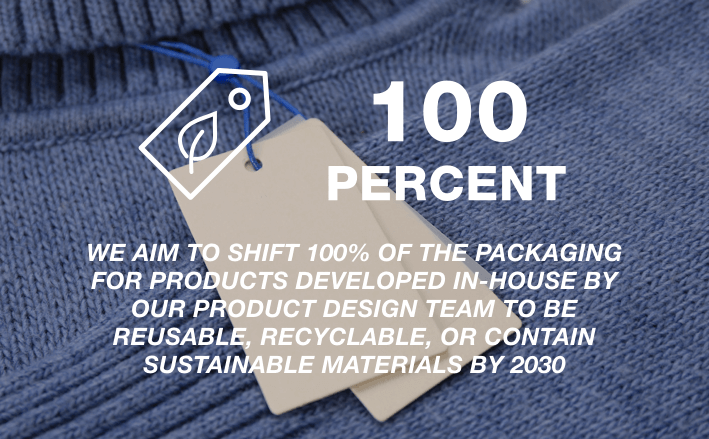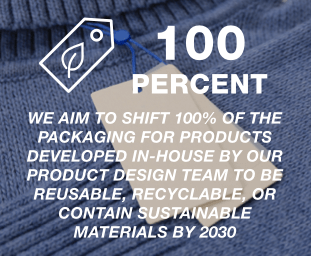

SASB: CG-MR-410a.2; CG-MR-410a.3
TJX believes in the importance of responsible and ethical sourcing in our supply chain. We strongly value the relationships that we have developed with our vendors, which are built on a foundation of honesty, trust, and ethical business practices. We believe these relationships have been a key factor in our long-term success.
Our responsible sourcing initiatives cover a variety of evolving areas of interest. These include our long-standing Global Social Compliance Program, as well as newer initiatives related to the environmental impact of certain products and packaging and chemicals management within our operations.
Responsible sourcing and social compliance are tremendously challenging undertakings. Our efforts are rooted in continuous improvement, which we believe we can work toward by making our commitments clear to our vendors, buying agent(s), and Associates; through our auditing and training efforts; by responding to issues as appropriate for our business; and by continuing to assess opportunities to enhance reporting.
Global Social Compliance Program
Our Global Social Compliance Program is anchored around our Vendor Code of Conduct, which outlines our expectations for our merchandise vendors. The Global Social Compliance Program also includes our expectations for our merchandise factory monitoring and supplier training program, which is focused where we have more influence in bringing the products to market. This means our auditing and training typically reaches factories that produce merchandise that we have helped design or develop to be manufactured just for us. We believe this is where we are most likely to be able to have a meaningful impact. Learn more about our commitment to Global Social Compliance.
Sustainable Products and Packaging
We are taking initial steps to look for ways that we may reduce the environmental impact of certain products and product packaging. As we source merchandise, product packaging, and supplies for our own operations, we may find more opportunities to procure products and materials with sustainable attributes and we have increased our capability to identify such opportunities.
- We aim to shift 100% of the packaging for products developed in-house by our product design team to be reusable, recyclable, or contain sustainable materials by 2030.
- Along the way, we plan to phase out use of PVC in packaging of certain soft home products developed in-house by our product design team by 2025; this will include packaging for certain top-of-bed styles, easy-care table linens, outdoor seating cushions, and outdoor pillows.
Our internal teams are making progress against these targets by prioritizing key packaging categories where there are sustainable materials alternatives both readily available in the marketplace and feasible for our business.
To support our efforts to source merchandise and packaging with sustainable attributes, we have developed a framework to define sustainable product attributes, which includes materials that can be verified by a credible third-party process or certification. Our subject matter experts also have compiled a list of preferred sustainable product certifications in certain product categories that can be used across all of our divisions, globally. In addition, we have been increasing our capability to identify opportunities to source materials with sustainable attributes, including recycled and/or organic materials, in select styles where we are helping to design or develop merchandise to be manufactured just for us. We are working towards developing information sessions for select vendors to support internal business partners in sourcing products that contain verifiable sustainable materials, and we added resources to the Environmental Sustainability team dedicated to overseeing and guiding our sustainable product sourcing efforts.
Examples of how we are integrating sustainable materials in packaging and with certain products our style and fashion experts have designed include:
- We have utilized Forest Stewardship Council (FSC)-certified paper for our hangtags for certain products our style and fashion experts have designed.
- Many of our stationery, gift wrap, and gift bag styles are printed on FSC-certified stock.
- Some of our children’s clothing is produced with 100% Global Organic Textile Standard (GOTS)-certified cotton.
- In select ladies and junior knit apparel styles, we are finding opportunities to include recycled polyester.
- Select outdoor furniture sold at our stores is made with FSC-certified wood.
- We have utilized wool from certified responsible sources for certain knitwear apparel sold at select T.K. Maxx stores in Europe.
- Certain of our soft home and children’s products have been certified by OEKO-TEX® MADE IN GREEN and OEKO-TEX® Standard 100, respectively.
- Most of the reusable merchandise carry-out bags sold in our stores globally contain recycled materials.
Chemicals Management
Since we operate a large, complex, international business, we focus our efforts in areas where we believe we can have a meaningful impact and that are most feasible for our business model. As we continue to learn and build our programs in this area, we are exploring ways to manage chemicals of concern in our operations as well as in certain products we sell.
We are currently working on program development, including addressing opportunities in:
- Business operations
- Merchandise and packaging
- Industry, expert, and internal collaboration
Program Development
To aid in the development of policies limiting chemicals of concern in our operations and in certain products we sell, we are utilizing the Chemical Footprint Project (CFP) framework, specifically leveraging the Management Strategy section to review relevant industry focus areas.
In Fiscal 2022, we published TJX’s Chemicals Management Program. The program outlines our expectations for vendors and suppliers to reduce or eliminate certain chemicals of concern and also identifies the initial prioritization of categories where we intend to focus our efforts. We encourage all of TJX’s suppliers and vendors to become familiar with this Program as well as the best practices for safer chemicals management applicable to their industry and product type. We plan to continue to evolve our strategy and work to identify new and expanded policies where we may further limit the use of chemicals of concern within our complex off-price business model. We will continue to update as additional policies are finalized.
Initiatives Within Our Business Operations
Phase 1:
- We have implemented our plan to phase out all phenol-based coatings on paper customer sales receipts in the U.S., Canada, Europe, and Australia.
- We replaced our serveware in our home office cafeterias with PFAS-free options. In the U.S., we are using PFAS-free compostable serveware, in Canada we are using PFAS-free reusable containers, and in Europe we are using a mix of reusable and PFAS-free compostable serveware.
- We are developing a TJX U.S. Operational Cleaning Supplies Policy that identifies products that meet certain third-party standards. In select stores, we are piloting the use of these cleaning supplies.
Merchandise And Packaging Initiatives
Phase 1:
- We have developed a buyer tool for Winners beauty buyers to identify beauty products free of certain chemicals of concern.
- We plan to phase out PVC in product packaging of certain products sold in our stores.
- We are working to identify industry-accepted third-party certifications that demonstrate safer chemicals management practices for certain product categories.
Industry, Expert, And Internal Collaboration
We are collaborating with others in the industry as well as outside experts and internal stakeholders:
- We are members of the Green Chemistry and Commerce Council (GC3) for external industry collaboration in the area of chemical management. The mission of GC3 is to promote safer chemicals, materials, and products across retail supply and value chains.
- We are members of Closed Loop Partners’ Consortium to Reinvent the Retail Bag, as the Apparel Sector Lead Partner. The Consortium’s Beyond the Bag Initiative convenes leading retailers, aiming to identify, test, and implement viable design solutions and models that more sustainably serve the purpose of the current retail bag.
We believe that the innovative solutions resulting from this effort could benefit the environment in many ways and could ultimately limit the amount of plastic waste generated from retail point-of-sale bags, and associated harmful chemicals, from entering the environment. Learn more about our efforts to reduce single-use plastics in Waste Management.
- In Fiscal 2023, we joined the Sustainable Packaging Coalition (SPC), an industry working group dedicated to a more robust environmental vision for packaging. The group aims to support innovative, functional packaging materials and systems that promote economic and environmental health.
- We partnered with an outside expert to conduct a landscape review of chemicals management for certain beauty and personal care formulated products. This included peer benchmarking, a review of third-party certifications, and an overview of chemicals of concern in these products.
- TJX subject matter experts from each of our major geographies have collaborated to identify a list of third-party certifications for wood/paper and textile products that represent safer chemical management.
Going forward, we will assess the potential to expand our strategy and coverage around chemicals management. Learn more about our Chemicals Management Program.
Additional Responsible Sourcing Practices
Conflict Minerals
At TJX, we are committed to complying with the rules and regulations impacting our business, including those under Section 1502 of the Dodd-Frank Wall Street Reform and Consumer Protection Act, intended to address violence and human rights abuses in the Democratic Republic of the Congo (the DRC) and adjoining countries. These rules require public companies to determine if they manufacture or contract to manufacture any products where “conflict minerals” - specifically tin, tantalum, tungsten, and gold (or “3TG”) - are necessary to the functionality or production of the product, and if so, whether those minerals originated in the DRC or adjoining countries. Companies are required to do additional diligence about the source and chain of custody of those minerals that may have originated in the covered region to determine if they came from sources that benefited armed forces in the region.
As demonstrated by the TJX Vendor Code of Conduct and our Global Social Compliance Program, we believe in the importance of responsible sourcing. TJX is many layers removed from the mining, smelting, or refining of any minerals contained in the products we sell, so we must rely on our vendors to collect current, complete, and reliable information to comply with these rules. We expect that our affected vendors will not knowingly supply us with products that include conflict minerals that directly or indirectly benefit armed groups in the DRC or adjoining countries, although we do not discourage responsible sourcing from that region. We further expect our vendors and buying agent(s) to comply with our requests to provide us with information and perform due diligence regarding their sourcing of the minerals at issue. We will consider appropriate remediation steps if we find that a vendor has violated this policy.
Fur Practices
TJX’s businesses around the world are fur-free. Our businesses also do not knowingly source goods containing angora (rabbit) fibers. From time to time, our businesses may offer products containing shearling, haircalf, or hide. The process of procuring merchandise for our off-price model is complex, and if an item containing fur is mistakenly sent to our stores or e-commerce sites, we work quickly to remove the item.
We are also committed to continuous improvement in the ethical sourcing of products intended for sale in our businesses. Over the years, we have expanded our restrictions in this area, including, most recently, banning for sale any items containing angora (rabbit) fibers. As part of our ongoing considerations regarding animal welfare, information about our fur practices has been included in our social compliance training since 2018. Importantly, at all times, TJX is committed to conducting business in compliance with all applicable laws, rules, and regulations, including but not limited to, animal protection laws.
Updated September 2023